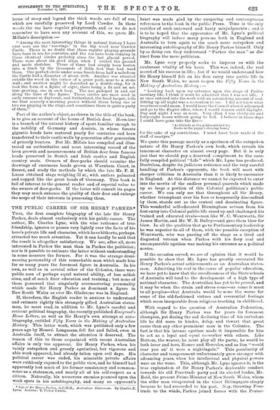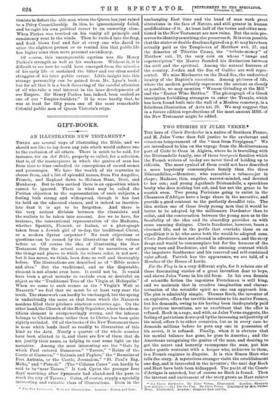THE PUBLIC CAREER OF SIR HENRY PARKES.* Tras, the first
complete biography of the late Sir Henry Parkes, deals almost exclusively with his public career. The author, Mr. Charles Lyne, with the wise reticence of true friendship, ignores or passes very lightly over the facts of his hero's private life and character, which have hitherto, perhaps, attracted too much attention. Yet it can hardly be said that the result is altogether satisfactory. We are, after all, more interested in Parkes the man than in Parkes the politician ; nor is it possible to estimate the latter without understanding in some measure the former. For it was the strange domi- neering personality of this remarkable man which made him for so many years the foremost figure in Australia. In his own, as well as in several other of the Colonies, there were public men of perhaps equal natural ability, of less selfish aims, and of much finer education and training ; but none of these possessed that singularly overmastering personality which made Sir Henry Parkes as dominant a figure in New South Wales as ever Mr. Gladstone was in England.
If, therefore, the English reader is anxious to understand and estimate rightly this strangely gifted Australian states- man, he must read, in addition to Mr. Lyne's careful and reticent political biography, the recently published Emigrant's Home Letters, as well as Sir Henry's own attempt at auto- biography, entitled Fifty Years in the Making of Australian History. This latter work, which was published only a few years ago by Messri. Longmans, fell flat and failed, even in Australia itself, to attract the attention it deserved. The reason of this to those acquainted with recent Australian affairs is only too apparent. Sir Henry Parkes, when his vainly outspoken and grossly egotistical, but vigorous and able work appeared, had already fallen upon evil days. His political career was ended, his miserable private affairs were ruthlessly exposed to the public view, and he himself had apparently lost much of his former consistency and common- sense as a statesman, and nearly all of his self-respect as a citizen. Naturally, his numerous enemies pounced upon the weak spots in his autobiography, and many an opponent's
• Life of Sir Henry Parkes, G.C.M.G„, Australian Stateaman. By Charles E. Lyne. London: T. Fisher Unwin.
heart was made glad by the unsparing and contemptuous references to the book in the public Press. Time is the only rectifier of such untoward and hasty misjudgments ; and it is to be hoped that the appearance of Mr. Lyne's political biography will induce many persons both in England and Australia to turn again to the much more outspoken and interesting autobiography of Sir Henry Parkes himself. Only
by so doing can they understand " Parkes the man" as dis- tinct from the mere politician.
Mr. Lyne very properly seeks to impress us with the exuberant vitality of his hero. This was, indeed, the real secret of his success in life ; but if we would understand how Sir Henry himself felt on his first entry into public life in New South Wales, we must reopen the Fifty Years in the Making of Australian History :—
"Looking back upon my entrance upon the stage of Parlia- mentary life, I think it must be admitted that I was not idle. I at once entered into the work with an astonishing amount of zeal. Sitting up all night was a recreation to me. I did not know what weariness could mean. I would leave the Council when it adjourned and go to the Empire office, where I would remain until daylight. Day and night I was at work. Very often I was thirty-six and forty-eight hours without going to bed. I believe in those days I could have gone into the fire— 'As blithely as the golden-girdled bee Sucks in the poppy's sleeping flame,'
for the sake of my convictions. I must have been made of the stuff of martyrs."
We quote this passage merely as a specimen of the outspoken nature of Sir Henry Parkes's own book, which reveals his innermost character on almost every page. But it is only just that we should pay a deserved compliment to the care- fully compiled political "Life" which Mr. Lyne has produced. Doubtless, despite its judicious reticence and the very careful handling of Parkes's opponents, the book will meet with sharper criticism in Australia than it is likely to encounter in England. At this distance we cannot be expected to enter into the merits of the endless personal quarrels which made up so large a portion of this Colonial politician's public career. We can only see that throughout all Sir Henry, whether triumphant over his foes or temporarily discomfited by them, stands out as the central and dominating figure. This wonderful self-educated Birmingham artisan from his first entry into Colonial public life stood up and challenged his trained and educated rivals—men like W. C. Wentworth, Sir James Martin, and Mr. W. B. Dailey—and gave them blow for blow. In all the qualities that go to Parliamentary leadership he was superior to all of them, with the possible exception of Wentworth, who was passing off the stage as a tired and disgusted veteran when Parkes with his fiery zeal and unconquerable egotism was making his entrance as a political novice.
If the occasion served, we are of opinion that it would be possible to show that Mr. Lyne has greatly overrated Sir Henry Parkes's actual achievements as an Australian states- man. Admitting his zeal in the cause of popular education, we have yet to know that the creedlessness of the State schools of Australia will tend to the development of a high type of national character. The Australian has yet to be proved, and it may be when the strain and stress come—as come it must to all peoples—that Australia would be none the worse for some of the old-fashioned virtues and reverential feelings which seem inseparable from religious teaching in childhood.
With regard to the question of Australian Federation, although Sir Henry Parkes was for years its foremost champion, yet during the sad declining time of his turbulent life he did more to hinder, delay, and thwart that great cause than any other prominent man in the Colonies. The fact is that his intense egotism made it impossible for him to act as a loyal and equal co-worker with others. Like Bottom, the weaver, he must play all the parts ; he would be both lover and hero, Romeo and Hercules, and as lion "would roar you an' it were a nightingale." This peculiarity of character and temperament unfortunately grew stronger with advancing years, when his intellectual and physical powers were on the wane. This, although Mr. Lyne ignores it, is the true explanation of Sir Henry Parkes's deplorable conduct towards his old Free-trade party and its elected leader, Mr. Reid, the present Prime Minister of New South Wales, whom the older man vituperated in the vilest Billingsgate simply because he had succeeded to his post. Nay, throwing Free- trade to the winds, Parkes joined forces with the Protec-
tionists to defeat the able man whom the Queen has just raised to a Privy Councillorship. In this, he ignominiously failed, and brought his own political career to an unworthy close. When Parkes was touched on his vanity all principle and consistency went to the winds. Then he rushed into the fray, and dealt blows foul and fair at every one who dared to utter the slightest protest or to remind him that public life has higher aims than mere personal ascendency.
Of course, this unconquerable egotism was Sir Henry Parkes's strength as well as his weakness. Without it, it is difficult to see how he could have emerged from the miseries of his early life or sustained the bitter and too often sordid struggles of his later public career. Little insight into this strange personality can be gained from Mr. Lyne's book ; but for all that it is a book deserving of the careful attention of all who take a real interest in the later developments of our Empire. Sir Henry Parkes has, indeed, been ranked as one of our "Empire-builders." If he were hardly that, he was at least for fifty years one of the most remarkable Colonial public men of Queen Victoria's reign.























































 Previous page
Previous page